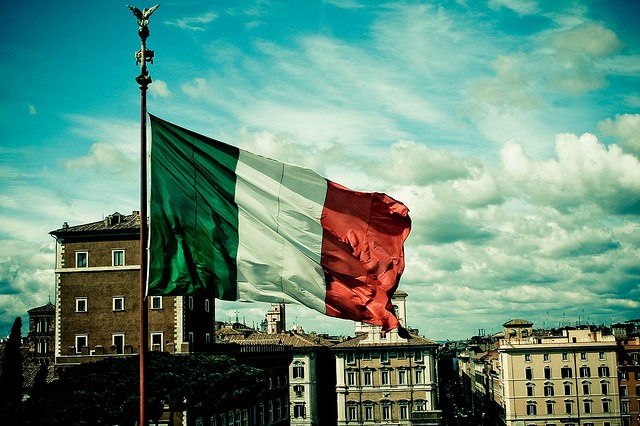 I was on vacation in Italy last week and had no intention of writing anything. However, there’s nothing like firsthand observation to study the contrasts and contradictions of the almost unique situation that this country finds itself in, and the major role it might play in the financial demise of Europe. The resignation of Pope Benedict XVIII and the general election for a new national assembly had brought things to a head, the country was in a mood somewhere between anger, frustration and apathy, and the contrasts between the “bests” and the “worsts” were striking.
I was on vacation in Italy last week and had no intention of writing anything. However, there’s nothing like firsthand observation to study the contrasts and contradictions of the almost unique situation that this country finds itself in, and the major role it might play in the financial demise of Europe. The resignation of Pope Benedict XVIII and the general election for a new national assembly had brought things to a head, the country was in a mood somewhere between anger, frustration and apathy, and the contrasts between the “bests” and the “worsts” were striking.
Our destination was Florence, and at first glance, this wonderful city of a hundred palaces and museums, shops brimming with high quality luxury goods proudly wearing the Made in Italy label seemed to be the glittering symbol of a prosperous nation and a proud people. Unfortunately, the only “best” that Florence reflects is that of a bygone age when, at the height of the Renaissance, it was the cultural capital of the world, graced by the likes of Leonardo and Michelangelo. The Italy of today reflects a rather different picture. On the brink of another financial crisis and with a youth unemployment rate of 37%, it is an economy on the verge of paralysis and a country in political limbo. Three significant events contributed to this...
First, the crisis in the Vatican triggered by the sensational resignation of the Pope led to speculation that all is not well in the Holy City. Rumours abound that gay priests in important positions are being blackmailed by male prostitutes. There was a grudging admission that His Holiness decided not to release an investigative report (on this and other alleged misdeeds) commissioned by him, or even show it to the cardinals who will gather in a conclave to elect his successor. It has been locked in a drawer and marked for the attention of the new incumbent to do with as he sees fit. Even worse (and some observers see this as the main reason for his departure) are the reports over the last year of the rift between the Papacy and the Vatican Bank. The appointment of a commission to oversee the operations of the bank, and the bank’s resistance to this “constraint” on its operations, led to the abrupt dismissal of its head last May. In one of his last actions before he left office, Pope Benedict XVIII appointed a fellow German to the post. One is left with the uneasy feeling that this is not the last we will hear of this story...
The second event came to my attention almost by accident while on a day trip to the historic city of Siena, 70 km from Florence and home of the famous bi-annual Palio di Siena, a traditional medieval horse race. The city has been mentored for the last 5 centuries by the Banco Monte dei Paschi di Siena, the world’s oldest bank which was founded in 1472 and Italy’s third largest. The bank has not only been the city’s largest employer, but also by far its largest benefactor over the centuries. Unfortunately, due to a volatile combination of “politics, poor management and inadequate supervision” as The Economist terms it, this venerable institution almost failed and needed to be bailed out by the Italian government to the extent of US$ 5.3 billion. Result, hundreds of branches closed and over 4000 jobs lost! And as if this was not enough, the social services of the city of Siena have been left without any funding.
Which brings me to the third, and by far the most important, of the events that will shape the Italy (and Europe) of tomorrow: the general election. Post World War II Italy has been a colourful and robust popular democracy; 60 odd elections with an average turnout rate of over 80% over the years. Anyone from porn stars to media moguls can (and did) stand, and win! The 2013 elections however were anything but ‘average’, with one of the lowest turnout rates (55%) ever recorded. The big shock was the emergence of what I call a New Dimension in Italian politics at the national level, the upstart Five Star Movement. It is neither Far Left nor Far Right; it is simply, Far Out and Fed Up! And it is led by a clown, yes, a popular professional comedian named Beppe Grillo. It received a total of 25.55% of the popular vote, barely 4% less than each of the centre-left and centre-right coalitions, making it the largest single party. Mr. Grillo has repeatedly said that they “...won’t think of even teeny-weeny deals,’’ with any of the mainstream parties, which only leaves open the Greek-style option of a grand coalition between the two main parties which, at least at the moment of going to press, seems highly unlikely. All the indications point to fresh general elections and a prolonging of the state of political limbo when urgent action is called for.
Mr Grilli is hardly a newcomer to the game, being banned from Italian television in the 80s for mocking corrupt politicians. He started his blog in 2005 and formed his Five Star Movement in 2008 based on a manifesto of improving the quality of public water, transportation, development, Internet availability, and the environment, issues rarely addressed by entrenched politicians. Five Star candidates, known as ‘‘Grillini,’’ soon began making a mark in local elections, winning seats in the legislatures of the Sicily region and the city of Parma. Conditions to become a candidate are strict - no criminal or previous political affiliations are permitted, lawmakers must quit after two terms, and may keep only a small percentage of the monthly salary that Italian elected representatives typically earn. The rest is put into a fund for small and medium businesses planning to expand and create jobs. Eschewing cars and other perks of office is a must. Those interested — mostly young, eager professionals under the age of 45 — post videos and profiles of themselves on Mr. Grillo’s blog, and are then chosen through an online vote. A radical change from the status quo that has existed for so long.....
The sad truth is that over the years Italy has been ruled by an Unholy Trinity of old-school politicians in bed with the Mafia and the Church, concerned primarily with protecting their own interests rather than those of the state. Mr Grillo’s grass roots campaign and adroit use of his wildly popular blog and other social networks have finally brought this message home to the people, and who can blame them for supporting him as they have?
The real tragedy here is that a genuinely reformist and idealistic movement supported by the people will become the scapegoat and be blamed for the stalemate and its consequences.
In economic terms, the most worrying trend is the fact that fully 90% of the electorate voted for an end to austerity measures. The centrist coalition of outgoing Prime Minister Mario Monti, largely responsible for saving Italy from having to ask for a bailout like Greece, courageously stood on a platform of continued austerity... and received just over 10% of the vote. This guarantees that any new government will take Italy to the brink of another financial collapse, and worse, risk spreading the contagion to Greece, Portugal, Spain and even France.
Will Italy be the spark that ignites the European conflagration? Or will the fear of other Five Star Movements finally force the Establishment to see the light and mend its ways? My own view is that the situation will get a lot worse before it gets better...
photo credit: davekellam via photopin cc


 I was on vacation in Italy last week and had no intention of writing anything. However, there’s nothing like firsthand observation to study the contrasts and contradictions of the almost unique situation that this country finds itself in, and the major role it might play in the financial demise of Europe. The resignation of Pope Benedict XVIII and the general election for a new national assembly had brought things to a head, the country was in a mood somewhere between anger, frustration and apathy, and the contrasts between the “bests” and the “worsts” were striking.
I was on vacation in Italy last week and had no intention of writing anything. However, there’s nothing like firsthand observation to study the contrasts and contradictions of the almost unique situation that this country finds itself in, and the major role it might play in the financial demise of Europe. The resignation of Pope Benedict XVIII and the general election for a new national assembly had brought things to a head, the country was in a mood somewhere between anger, frustration and apathy, and the contrasts between the “bests” and the “worsts” were striking.
J'adore ta caricature